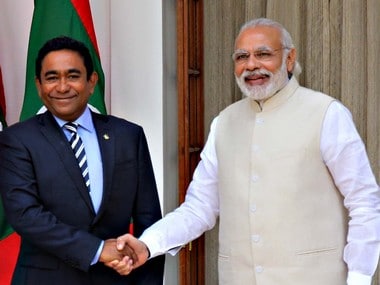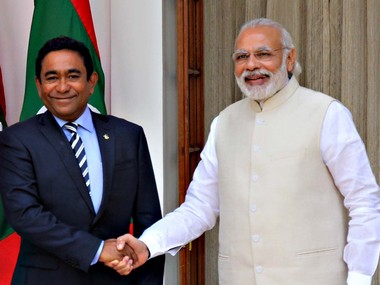So the word is out. According to a senior official quoted in a national daily, India has indicated that it would not intervene in Maldives. The rider is that New Delhi expects China to show reciprocity by not crossing certain red lines or “lines of legitimacy” in the neighbourhood. The statement is likely to be greeted with malice by India baiters across the subcontinent and beyond. Before they pop the champagne corks however, a little disaggregation of this apparent Indian position is in order. [caption id=“attachment_4361909” align=“alignleft” width=“380”]  File image of Abdulla Yameen and Narendra Modi. Twitter@PMOIndia[/caption] With regard to Maldives, there was never at any time a reasonable military option of intervention. The reasons for this have been earlier outlined by this writer but to summarise: An intervention is inevitably open-ended, expensive in multiple ways, and is highly unlikely to deliver the objectives of the operation, which is to ensure a friendly and cooperative Maldives. In fact, the end result would probably be the reverse.
Therefore when India is giving up intervention, it is giving up something that was never an option.
The decision not to intervene is not a sign of weakness per se. Neither should actual decision making on intervention be prompted by Chinese investment in the archipelago. Consider that not even the United States is able to control its neighbourhood effectively. President Donald Trump’s fight to build a ‘Great Wall” on the Mexico border is one indication of just how low policy has fallen. China is also heavily investing in Latin America. President Xi Jinping had, in fact, announced the intention to invest $250 billion in those countries several years ago, together with a target of $500 billion in trade. Though that may not have entirely fructified, it is not something that Washington can actively or publicly oppose. It would, however, use other methods to ensure that such investments did not affect its own national security concerns. Moreover, analytical studies indicate that Chinese investment in the area was usually limited to those countries with poor access to international finance. More importantly, the study also observed that Chinese presence did not directly contribute to a lowering of political stability and erosion of democracy. That was primarily a function of domestic decision politics. In other words, Maldives president Abdulla Yameen’s authoritarianism is dictated by his own domestic agenda, but may be exacerbated by the knowledge of China as a balancing power in terms of warding off Indian military intervention. But Indian pressure and subtle persuasion — which is one way of putting it — can still be applied to influence domestic decision making and restore stability.
The message to Beijing therefore is: Don’t interfere in this area. We can handle it, without losses to your economic interests.
China’s investments in our neighbourhood are, however, considerable. A key study by Gateway House totals Chinese investment in these countries at about $150 billion. A good part of this — estimated at about $62 billion — is in Pakistan, followed by Myanmar. This, again follows the pattern of Chinese investment, in that it is offered where the regime is either suspect or it has poor access to international finance. The perils of Chinese financing are, however, now far more evident than before. The International Monetary Fund and the World Bank predict that Maldivian debt will soon reach 120 percent of its GDP. An independent analysis also puts Maldives in the very high risk category. Maldivian media is cautiously beginning to highlight these risks, criticising for instance, the lack of transparency in the terms set for Chinese loans. A turning away from Chinese financing is also apparent in Myanmar, where a democratic government has chosen to diversify its sources of investment rather than rely only on Beijing. Chinese sources observe that investment there has fallen in the last year, even as countries like Singapore and Vietnam increased their presence. China, however, still remains the largest investor. Quoting the Chinese Directorate of Investment and Company Administration, the paper provides the figure of total investments in the country as $18.5 billion since 1988. However, recent events point to a possibility that Chinese financing offers are now being rejected not so much because of its iniquitous clauses — for instance virtual ownership in the case of a power project in Pakistan — as much as the fact that political leaders are beginning to fear the erosion of their own decision making powers.
A country that buys not only into your infrastructure but also your stock exchange is one that is likely to tread on sovereign toes.
To sum up, the crucial aspect of India’s stance seems to be the enunciation of new red lines or what is being called “ lines of legitimacy” — a term which is incomprehensible and unclear about our legitimate rights in the neighbourhood — and ‘violation of strategic trust’. The latter is far more comprehensible, though again vague as to what constitutes its violation. An intentionally vague statement is no bad thing. What is dangerous is if policy makers are vague themselves. To the discerning public and certainly to Chinese policy makers, there is one clear red line for India. That red line would be crossed if China were to set up a military base in our neighbourhood, including in Pakistan. The future of Hambatota, and Gwadar will therefore need to be closely monitored, as well as the Chinese virtual takeover of parts of the Maldivian archipelago. There are other lines that are not so clearly ‘red’ at first glance, but are developments that hint at definite dangers to India. One such is the proposal by China to link Kathmandu with Lhasa. This needs to be resolutely opposed by New Delhi. But, as the Indian statement clearly indicates, the days when one could demand compliance, if indeed such days ever existed, are long over. If India opposes the rail project, it should be prepare to offer something better. The simple lesson was one we should have learned years ago: A regional ‘sphere of influence’ demands a continuous and consistent policy of investment and assistance, rather than threats to close a border. Therefore, in the final analysis, we rather desperately need two specific capabilities. First, the military ability to counter a possible move by China to cross a specific red line. This needs a close analysis on its possible overflow into other borders and areas of dispute, and resultant capabilities required. At present, it doesn’t seem that this capability is being prioritised. Second, is the quick increase of alternative financing to vulnerable states. Given large Chinese pockets, this obviously requires a group of nations acting in concert. The recent visit by Japanese foreign minister Taro Kono, bearing gifts of investment for Sri Lanka’s ports is one pointer to a possible push back. More is needed, and quickly. Meanwhile, get ready with the simpler things. In 2014, India rushed 1,000 tonnes of drinking water to a parched Maldives after a massive fire broke out at its own plant. Chinese ships and aircraft arrived too. But geography has the final say. Chinese ships had to sail nearly 50 hours to do the deed. We’re just a hop away. With desalination plants being prohibitively expensive, find ways to offer Male that glass of water at cheaper rates. The champagne can be popped later.


)

)
)
)
)
)
)
)
)



